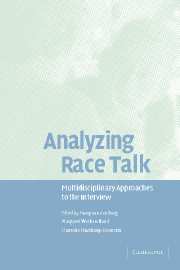Book contents
- Frontmatter
- Contents
- List of contributors
- Preface
- Acknowledgments
- Transcriptions symbols
- Introduction
- 1 Racism and the analysis of cultural resources in interviews
- 2 Analyzing racial discourse: the discursive psychology of mind–world relationships
- 3 Constructivist processes in discourse: a cognitive linguistics perspective
- 4 Institutional, professional, and lifeworld frames in interview talk
- 5 The uses of absurdity
- 6 Multiple voices in talking race: Pakeha reported speech in the discursive construction of the racial other
- 7 Contradictions in interview discourse
- 8 Racism, happiness, and ideology
- 9 The frame analysis of research interviews: social categorization and footing in interview discourse
- 10 Affiliation and detachment in interviewer answer receipts
- 11 Interviewer laughter as an unspecified request for clarification
- 12 Perspectives and frameworks in interviewers' queries
- Appendix: Interview transcripts
- Index
9 - The frame analysis of research interviews: social categorization and footing in interview discourse
Published online by Cambridge University Press: 22 September 2009
- Frontmatter
- Contents
- List of contributors
- Preface
- Acknowledgments
- Transcriptions symbols
- Introduction
- 1 Racism and the analysis of cultural resources in interviews
- 2 Analyzing racial discourse: the discursive psychology of mind–world relationships
- 3 Constructivist processes in discourse: a cognitive linguistics perspective
- 4 Institutional, professional, and lifeworld frames in interview talk
- 5 The uses of absurdity
- 6 Multiple voices in talking race: Pakeha reported speech in the discursive construction of the racial other
- 7 Contradictions in interview discourse
- 8 Racism, happiness, and ideology
- 9 The frame analysis of research interviews: social categorization and footing in interview discourse
- 10 Affiliation and detachment in interviewer answer receipts
- 11 Interviewer laughter as an unspecified request for clarification
- 12 Perspectives and frameworks in interviewers' queries
- Appendix: Interview transcripts
- Index
Summary
Introduction
The three interviews that are central to this volume are part of a corpus of interviews collected by Margaret Wetherell. The corpus is described in Wetherell and Potter (1992: 98–100 and 221–224). These interviews were conducted from within a conversational perspective on social research:
On the one hand, this involved the interviewer being an animated conversationalist, commenting and providing the sorts of “back channel” “ums” and “yes” responses that are characteristic of informal talk. On the other, this involved being prepared to be much more straightforwardly argumentative than would be appropriate in an orthodox research interview: offering counter examples, questioning assumptions and so on.
(Wetherell and Potter 1992: 99)This approach to research interviews acknowledges the intrinsic interactional nature of the interview situation. Interviews (even those that are conducted from the orthodox point of view) are conversations between an interviewer and a respondent. Hence they have properties that any human interaction has. They are open-ended, unpredictable, situation-bound, open to negotiation, and vulnerable to misunderstandings. In addition, the content of the interaction is influenced by emotional and relational factors (Cicourel 1964: chapter 3; Mazeland and Ten Have 1996). These properties preclude interactional materials from being fully interpretable out of context, within fixed interpretative coding schemata. The question then is, how to make use of interview materials in analysis?
In this paper, I propose to answer this question by considering interviews as based on frames. First, I will sketch a framework for the description of interviews as framed activities.
- Type
- Chapter
- Information
- Analyzing Race TalkMultidisciplinary Perspectives on the Research Interview, pp. 156 - 177Publisher: Cambridge University PressPrint publication year: 2004
- 5
- Cited by



